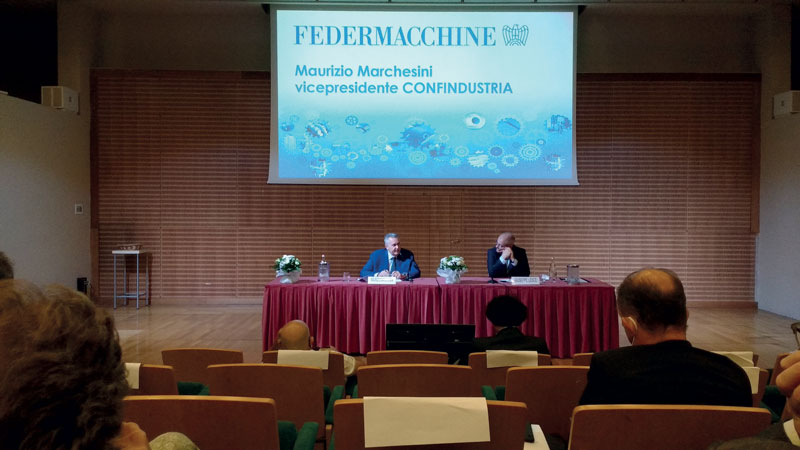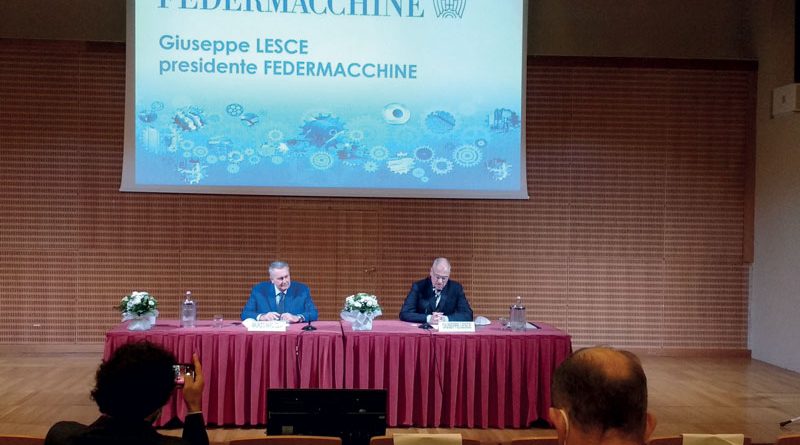The capital goods industry is back on track
After the end of a very complicated 2020, although better than expected at the start of the pandemic, the Italian capital goods industry will see a sustained recovery in 2021. This is what emerged from the annual meeting of FEDERMACCHINE last July, which was also attended by Maurizio Marchesini, vice-president of CONFINDUSTRIA.
After the collapse of 2020, the capital goods industry is back on track in 2021. Encouraging signs were confirmed at the Annual General Meeting of FEDERMACCHINE, the federation that brings together Italian capital goods manufacturers, held at last “in presence” on 21 July at the Grand Hotel Villa Torretta in Sesto San Giovanni. Giuseppe Lesce, president of the federation, opened the proceedings of the meeting which, every year, illustrates the state of the art and the perspectives of the sector. “The companies we represent – began Lesce – belong to different categories but they share a common spirit of innovation. This sector makes an important contribution to national industry, and not only that, but one that touches on our everyday lives”.
The drop in turnover was less severe than expected
The 2020 results, although better than expected, showed a 14% drop in turnover compared to 2019, to EUR 41 billion. The overall result was affected by both the sharp fall in exports – which plummeted to €28 billion, 14% less than the previous year – and the drop in manufacturers’ deliveries on the domestic market, down 15% to €14 billion: figures that give a measure of the impact of the health crisis on the sector represented by FEDERMACCHINE.
The reduction in consumption was also decidedly heavy, at just under EUR 21 billion, compared to EUR 26 billion in 2019 (-18%). On the other hand, the number of companies and employees remained unchanged: more than 200,000 people are employed in the sector’s approximately 5,000 companies.
It is worth noting the uneven performance of the various sectors; the crisis has had a greater impact on some than others; the food and pharmaceutical industries, for example, have not suffered a drop in turnover. Nevertheless, it is worth noting that the sector’s contribution to our country’s economy as well as to the balance of trade remains significant; the turnover of the Italian machinery industry is worth 2.5% of GDP. Thanks to the timid signs of recovery, felt as early as July 2020, the situation has been improving; this trend has led to a better-than-expected end to 2020. The first figures for 2021 also confirm a trend reversal: “Italian machinery exports grew by 6.8% in the January-March period – said Lesce. Sales in the EU, non-EU and South America are growing more than in other areas of the world. Italian imports also grew by 6.7% in the first quarter of the year, demonstrating a recovery of activity in the domestic market… but we will have to wait until 2022 for a full recovery”. The president also dwelt on the subject of investments in new machinery, which are recovering thanks to the policy of incentives that, he hoped, would become structural and not so much linked to a quantitative but rather an improvement in the machine park.
“Most of the machines purchased – he said – are equipped with numerical controls and it is essential that the improvement process continues in this direction. Complementary to this theme is the issue of training 4.0 and young people. It is therefore important for the government to take decisive action to update the educational offerings of the school system, especially those with a technical-technological vocation, especially the Higher Technical Institutes. This is to meet the shortage of professional figures available”.

The Federation Board of Directors has been renewed
At the end of the public meeting, the private session was held to renew the FEDERMACCHINE Board of Directors for the two-year period 2021-2022.
Giuseppe Lesce was confirmed at the head of the federation. He will be assisted in his activities by the two vice-presidents, also confirmed from the previous two-year period, Gabriella Marchioni Bocca, deputy vice-president, and Riccardo Rosa, vice-president.
The contribution of supply chains and SMEs for the development of the sector
Maurizio Marchesini, Vice-President of CONFINDUSTRIA, took part in the meeting to discuss the contribution of supply chains and SMEs to the development of the national capital goods sector. “The role of industry has held up in an unpredictable situation – he said – thanks to the fact that domestic industry is based on a flexible and resilient supply chain, capable of adding value. In this context, an industrial fabric made up of SMEs offers advantages and is a role that other countries cannot play. In these difficult times, digitalisation has offered a huge contribution, whether it be remote maintenance replacing on-site operations, virtual trade fairs, webinars organised by companies and so on. Flexibility is the result of digitisation and the implementation of 4.0 concepts in the digital transition, but only large companies have so far invested in this direction. Adequate tools will have to be found so that SMEs can also embark on a transformation that is now imperative”.

